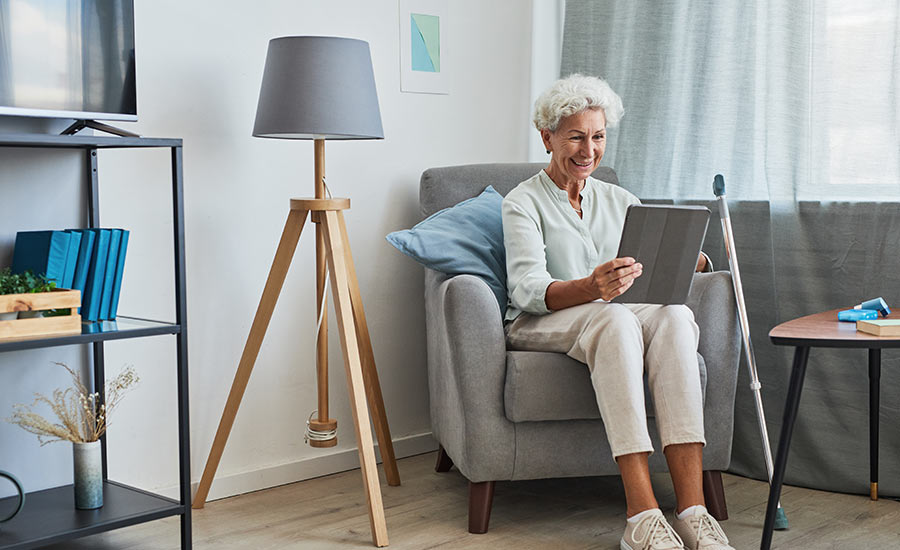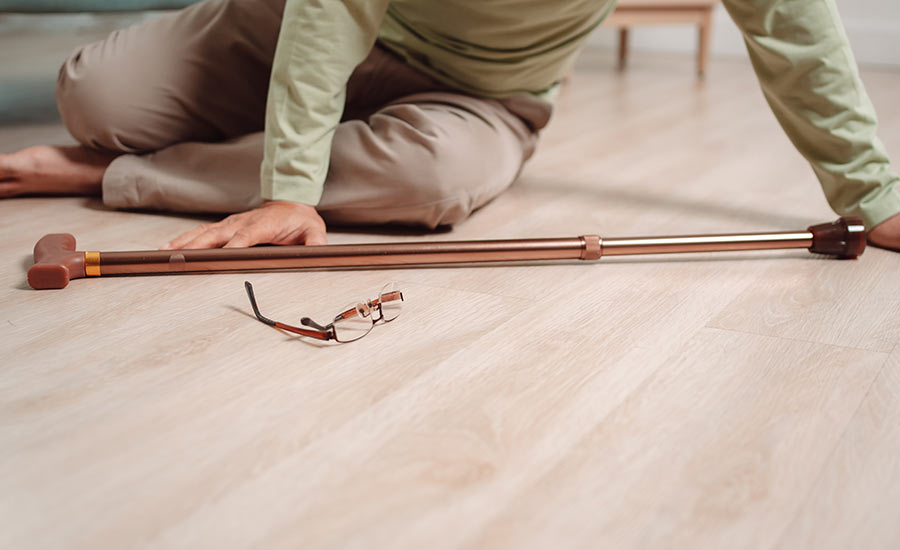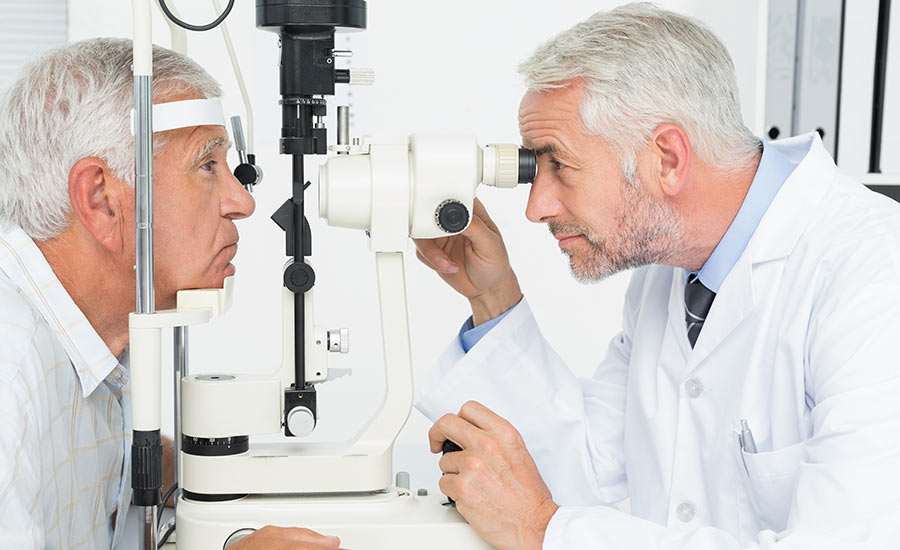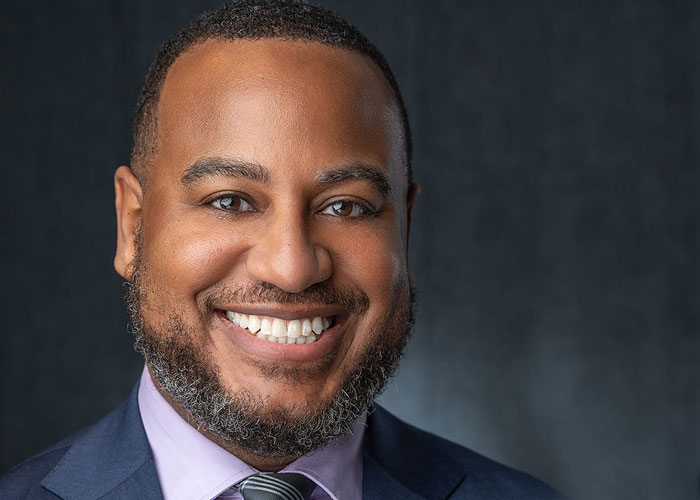16 Symptoms To Look for After an Elderly Fall

According to the Centers for Disease Control and Prevention, one out of five elderly falls can result in broken bones, cuts, lacerations, and head injuries.
If your loved one has recently fallen, there are certain signs to watch for like bruising and head injuries.
In this article, we’ll cover symptoms to look for after an elderly fall, how to treat elderly falls, and answer frequently asked questions surrounding elderly falls.
We’ll also introduce you to the Balance Tracking System and fall prevention program at Always Best Care Senior Services, to help assess your loved one’s stability and to help reduce the risk of future falls.
Table of Contents
Causes of Elderly Falls
Aging often leads to changes in muscle strength, blood pressure regulation, vision, hearing, and balance which can increase the risk of falling.
While elderly falls can occur due to different reasons, common causes include:
- Poor balance: Age-related changes in balance, due to deterioration in the inner ear, muscle strength, or reflexes, can make it more challenging to maintain stability.
- Foot problems: Toe deformities, such as bunions or hammertoes, can affect an elderly person’s balance and gait — an individual’s manner of walking — increasing the risk of falls.
- Fall risk medications: Medications that increase the risk of falls, such as antipsychotics, anticonvulsants, and antihypertensives can affect balance.
- Chronic health conditions: Conditions like arthritis, diabetes, or heart disease can affect movement, balance, and overall physical strength, increasing the likelihood of falls.
- Incontinence: The urgency and frequency associated with incontinence can cause seniors to rush to the bathroom, increasing the risk of slipping or tripping.
- Environmental hazards: Tripping hazards in the living environment, such as loose rugs, poor lighting, cluttered walkways, and slippery surfaces can increase the risk of falls.
16 Symptoms To Look for After Elderly Falls
Keeping an eye out for symptoms after an elderly fall can help you make sure that any complications or other injuries are promptly identified and addressed.
Symptoms to look for after an elderly fall include:
- Pain: Be alert to complaints of pain or discomfort, which can indicate fractures or sprains.
- Lacerations: Check for cuts or deep wounds that might need immediate medical attention.
- Tenderness: Pay attention to areas that are tender to the touch, which can signal internal bleeding.
- Tingling: Keep an eye out for tingling sensations that can indicate nerve damage.
- Swelling: Look for swelling in limbs or joints, which can be a sign of fractures.
- Bruising: Keep an eye out for bruises, which can appear hours or days after a fall.
- Head injuries: Look for signs of concussion or other head trauma such as confusion, headache, or loss of consciousness.
- Dehydration: Watch for symptoms of dehydration, which can cause confusion and dizziness.
- Irregular heartbeat: Check for any changes in your loved one’s heart rhythm, which can result from trauma.
- Pneumonia: Check for signs of pneumonia — especially if the fall resulted in reduced mobility.
- Vomiting: Look out for nausea or vomiting, which can be signs of a head injury or shock.
- Restricted mobility: Ask your loved one if they can move a limb or joint. If not, this can be a sign of a serious injury, such as a fracture, severe sprain, or even nerve damage.
- Changes in behavior: Watch for any unusual changes in behavior or mood, which can indicate a traumatic brain injury.
- Incontinence: Watch for incontinence, which can be a result of the fall.
- Vision problems: Check for any issues with vision, as head injuries can impact eyesight.
- Rhabdomyolysis: Look out for symptoms such as muscle weakness and dark urine, which can occur when muscles are damaged.

How To Treat Elderly Falls
If your loved one has experienced a fall or is struggling with balance issues, talk to their healthcare provider. Treatment plans might include a fall risk assessment, a medication review and other actions.
1. Evaluate Eyesight
Eye exams can help identify eye conditions that can contribute to elderly falls, such as poor eyesight and glaucoma.
For example, poor eyesight can affect depth perception, balance, and the ability to safely navigate around obstacles. On the other hand, glaucoma can cause vision loss or blindness.
If your loved one is experiencing recurrent falls, make an appointment with their ophthalmologist. In addition, make sure your loved one visits their optometrist at least once every two years to make sure their prescriptions for glasses or contact lenses are updated.
2. Assess Fall Risk
A fall risk assessment is typically conducted by a healthcare professional. It identifies factors such as your loved one’s stride time, step length, gait, and balance to pinpoint specific areas of vulnerability.
After a fall risk assessment, your loved one’s healthcare professional can determine if there are underlying joint problems or neurological conditions, such as Parkinson’s disease, that are contributing to an increased risk of falls.
3. Review Medications
Ask your loved one’s physician to perform an extensive review of their medications. Fall risk medications can have side effects such as dizziness, drowsiness, or low blood pressure, which can significantly increase the likelihood of falls.
By reviewing and possibly modifying your loved one’s medication, their physician can help reduce the risk of falls without compromising their treatment of other health conditions.
4. Encourage Your Loved One To Take Vitamin D and Calcium Supplements
Encourage your loved one to take Vitamin D and calcium supplements, as they can help strengthen bones, reducing the risk of fractures if a fall occurs.
Vitamin D can help promote bone health by absorbing the calcium you get from food and reversing osteoporosis — a condition that develops when bone mass and bone mineral density decrease.
In fact, the National Osteoporosis Foundation recommends an intake of around 800 to 1000 international units (IU) of Vitamin D3 per day for adults over 50 years old to slow down osteoporosis.
On the other hand, calcium supplements can help maintain and rebuild bone mass, further supporting skeletal health.
How To Prevent Elderly Falls
From reviewing medications to making sure your loved one is wearing the proper footwear, here are 12 fall prevention tips for seniors.
- Schedule regular health check-ups for your loved one: Book appointments for vision and hearing exams to identify conditions that can affect balance, such as poor vision.
- Review medications: Review your loved one’s medications with their healthcare provider, as some fall risk medications can cause side effects like dizziness or impaired balance.
- Make sure your loved one’s home is safe: Modify your loved one’s living environment to make it safe. Remove loose wires and rugs, install handrails and grab bars in the tub and bathroom, and install motion sensor lights in hallways.
- Encourage exercise: Make sure your loved one engages in exercises such as yoga and walking, to improve their strength, balance, and flexibility.
- Make sure your loved one wears proper footwear: Encourage your loved one to wear shoes that are sturdy and provide a non-slip grip to prevent the risk of slipping and falling.
- Prepare a nutritious balanced diet: Make sure your loved one consumes a balanced diet rich in calcium and Vitamin D to strengthen their bones. Encourage regular hydration to prevent dizziness and weakness.
- Implement a personal emergency response system (PERS): Equip your loved one with a personal emergency response system to help them call for immediate medical assistance whenever a fall occurs.
- Utilize mobility aids: Make sure your loved one uses mobility scooters, canes, or walkers if needed to help improve their balance.
- Conduct a fall risk analysis: Consider arranging a professional fall risk analysis for your loved one.
- Participate in fall prevention programs: Consider enrolling in programs that offer insights and exercise recommendations to improve strength, mobility, and balance.
- Educate your loved one: Teach your loved one to be cautious and mindful of potential fall hazards in different environments. For example, moving slowly on slippery surfaces or in crowded areas can help prevent falls.
- Utilize community resources: Take advantage of resources available in your community, such as local senior centers. These centers often offer fall prevention programs, support groups, and other resources that can assist in reducing fall risks.

Elderly Care at Always Best Care Senior Services
Founded with a deep commitment to delivering optimal senior care, Always Best Care Senior Services is comprised of a team of compassionate, devoted caregivers.
Operating in over 225 territories, we are committed to providing unwavering support and reliable care for your loved one.
We create a custom care plan for each client, which includes an evaluation of your loved one’s fall risk, using our Balance Tracking System.
Our care services include:
- In-home care services: We provide a wide range of services including 24/7 care, fall prevention, nutrition monitoring, meal preparation, companionship, overnight care, and more. Our caring team ensures your loved one receives attentive support in the comfort of their home.
- Skilled home health care services: We create tailored care plans for seniors recovering from illnesses and those with special needs. Our services, including chronic illness management, incontinence care, toileting assistance, and more, are personalized to meet your loved one’s specific needs.
- Specialized home care services: We monitor your loved one’s health using advanced methods and technology, such as remote patient monitoring and personal emergency response systems, to enable optimal health management.
- Respite care services: We offer you the opportunity to take a well-deserved break, so you can concentrate on work, attend to other personal responsibilities, or errands. Our skilled caregivers step in to look after your loved one, making sure they receive the same quality of attention and care that you would offer.
- Senior living referral services: We can help you locate the ideal senior living community for your loved one depending on their needs and geographical preference, to make sure they receive exceptional care.
- Veterans assistance program: We assist veterans in securing financial assistance for their healthcare needs, ensuring they receive the highest level of consideration and respect.
FAQs About Elderly Falls
Have more questions about symptoms to look for after elderly falls? Find the answers here.
What should I do if my elderly loved one falls?
If your elderly loved one falls, check for signs of injury. If they are in pain or show any symptoms of serious injury, like a headache or loss of consciousness, seek medical attention immediately.
If your loved one appears uninjured and can move, help them up carefully and monitor them closely for any delayed symptoms, such as increased pain or changes in mobility.
Inform their healthcare provider about the fall, as they may need a follow-up examination or adjustments in their care plan to prevent future falls.
How long does it take for an elderly person to recover from a fall?
The time it takes for an elderly person to recover from a fall depends on several factors, including the severity of the fall, the nature of the injuries sustained, and the individual’s overall health.
If your loved one slipped on a wet surface and suffered minor injuries, such as bruises or mild sprains, they could potentially recover within a few days to a week.
In cases of more serious injuries, such as fractures or head trauma, the recovery process can take much longer, possibly requiring physical therapy or other forms of rehabilitation.
When should my elderly loved one seek medical attention after a fall?
Your elderly loved one should seek medical attention after a fall if:
- They have sustained visible injuries such as cuts, bruises, or swelling — especially if these are severe or worsening
- They are experiencing pain — especially if it’s intense or does not subside over time
- They have trouble moving or can’t put weight on a limb





